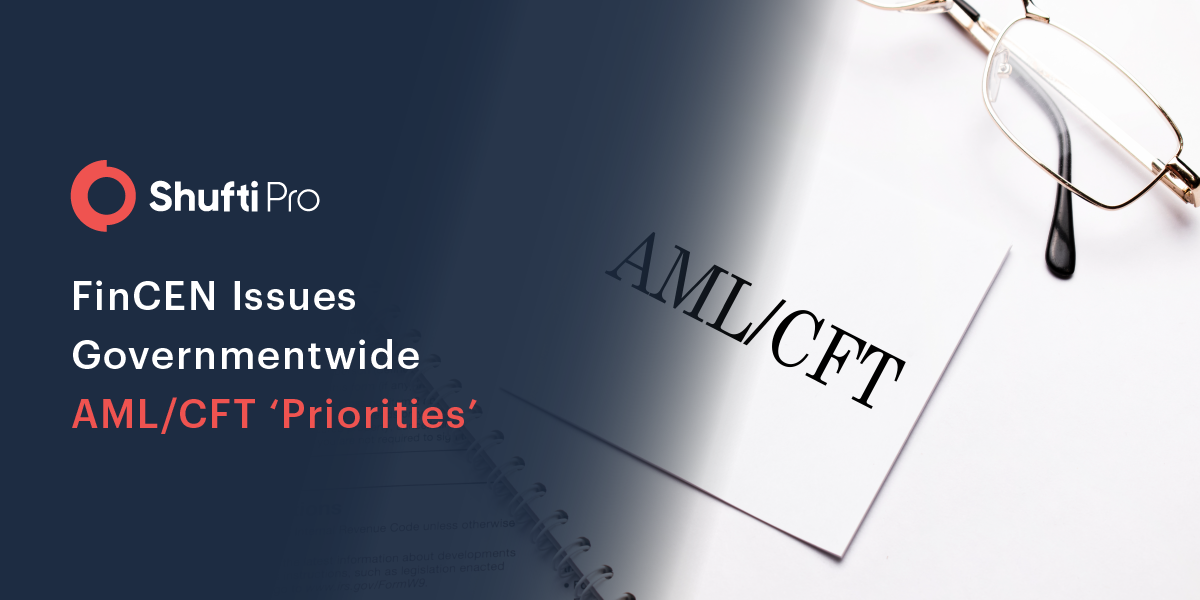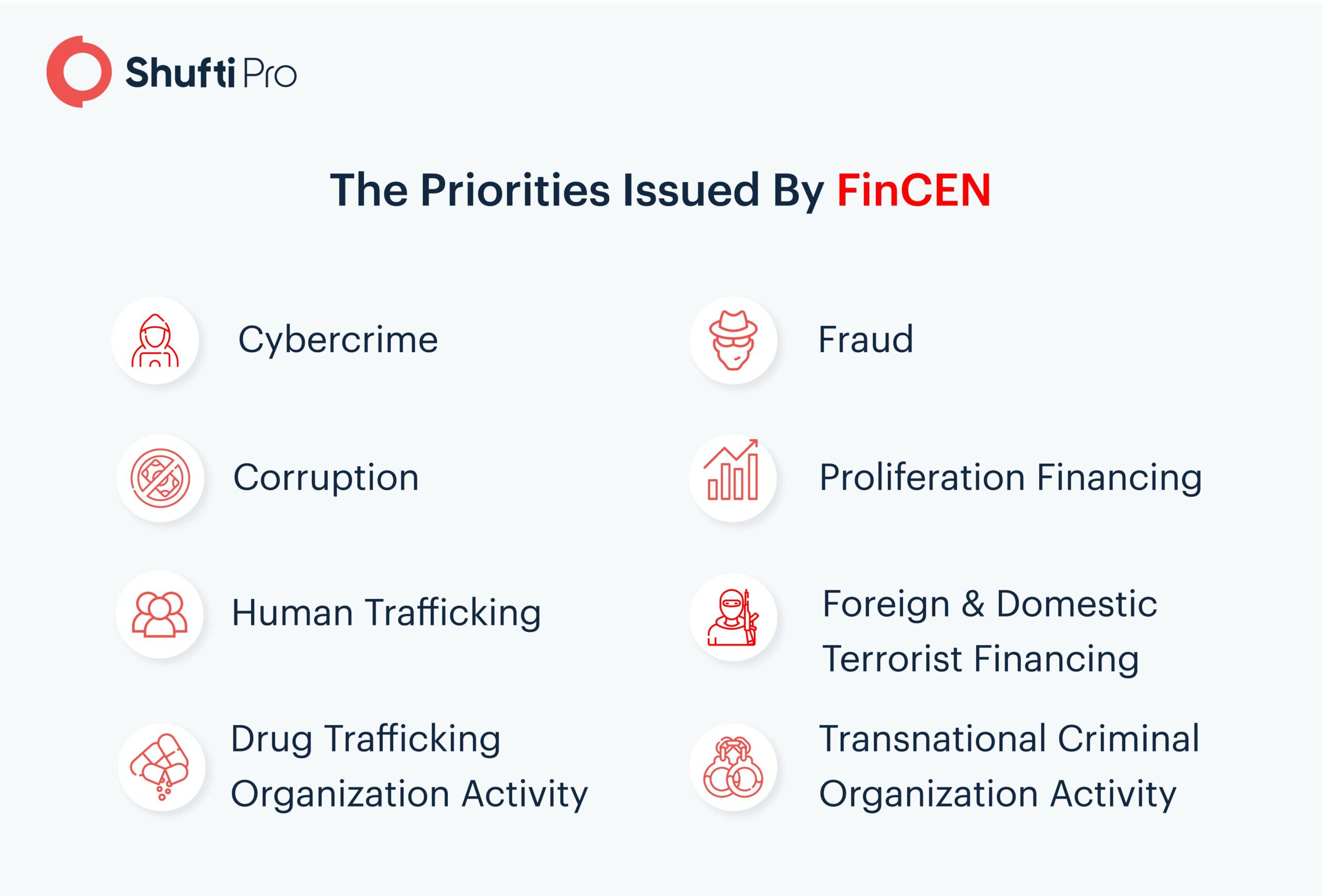The Priorities – FinCEN Issues First Governmentwide AML/CFT Guidelines

On June 30, 2021, Financial Crimes Enforcement Network (FinCEN) issued governmentwide AML and CFT guidelines for the first time called ‘The Priorities.’ These Priorities have been issued pursuant to Section 5318(h)(4)(A) of the Bank Secrecy Act (BSA). FinCEN aims at assisting all the financial institutions (FIs) covered in the BSA in their effort to effectively comply with the anti-money laundering and counter financing of terrorism policies. However, guidelines for FIs on how to incorporate The Priorities with AML policies will be issued later. All Priorities may not be relevant for every organisation but the ones appropriate for the business must be effectively met by the entity. The regulatory body states that it consulted several stakeholders and took all the threats to the US economy under consideration to develop The Priorities.
What is the Goal of FinCEN’s AML/CFT Priorities?
For the first time, FinCEN along with other major regulatory bodies in the United States has issued governmentwide guidelines. Combating money laundering remains the primary concern of FinCEN and Office of Terrorism and Financial Intelligence (TFI) which has been addressed in all the Priorities.
1- Corruption
Joe Biden issued a National Security Study Memorandum on June 03, 2021 according to which corruption leads to conflict and instability. Moreover, it results in disrupting the economic growth and it is estimated that two to five percent of the global GDP is laundered every year.
As per The Priorities, all addressed financial institutions must consult FinCEN advisories related to corrupt foreign entities and human right abuses in different regions like South Sudan, Venezuela, Nicaragua, etc. Furthermore, all the financial institutions must reconsider their AML/CFT policies and red flags along with increasing robustness of the programs related to senior foreign political figures and PEPs. The authority has also warned FIs about the high risks that these individuals pose on an organisation and so, enhanced monitoring of these individuals is crucial.
Suggested: 10 Red Flags to Detect Money Laundering in the Finance Sector
2- Cybercrime
Common cybersecurity threats mentioned by FinCEN include social engineering attacks like phishing, software vulnerability like ransomware, and network attacks. The size, speed, accessibility and reach of the finance sector can make it a viable outlet for financial criminals including terrorists. The target of these perpetrators is the websites, systems and all confidential information of the covered institutions. The Treasury is specifically concerned about the illegal use of virtual assets, FinCrime and ransomware attacks.
With respect to ransomware and COVID-19 related scams, FinCEN has issued advisories to warn addressed institutions about the predominant frauds. The authority has also issued a fact sheet that motivates covered institutions to share information about suspicious activities under BSA with one another to better identify and combat money laundering and other criminal proceeds.

3. Fraud
Drug smuggling, human trafficking, human smuggling, corruption, and organised crime are few of the noted frauds that generate most of the illicit proceeds in the United States by the Treasury’s National Money Laundering Risk Assessments. Among these frauds, banks consumer, healthcare, tax, and securities and investment frauds are considered as the largest illicit fund generating activities in the US. Healthcare fraud alone generates $100 billion illegal proceedings annually. For this, synthetic identity, identity theft and romance scams are the most commonly used techniques.
FinCEN has issued many advisories related to the aforementioned frauds and specifically targeted Business Email Compromise (BEC), email account compromise and COVID-related scams.
Suggested: Top 7 COVID-19 Related Scams and Frauds to Look For in 2021
4- Proliferation Financing
Another Priority from FinCEN is preventing ‘proliferation financing’ which refers to exploiting the country’s financial infrastructure for illicit movement of funds. These funds are either used for:
- Acquiring weapons of mass destruction
- Advancing or developing state-sponsored weapon programs including, evasion of US sanctions
Covered institutions must review their sanctions programs, especially economic and trade sanctions when they are trying to identify and report any suspicious activities (possibly associated with proliferation financing). This guideline is specifically for banks and other financial infrastructures that facilitate international transactions and these organisations must perform Know Your Customer (KYC) and Customer Due Diligence (CDD) protocols to identify perpetrators that might be engaged in such activities.
Recommended: A complete guide to understanding KYC compliance regulations
5- Terrorist Financing
Terrorist groups require funds to recruit and support members, conduct operations and fund logistics. To prevent financing (both domestic and international) of these groups, covered organisations are reminded of the current laws for identifying and filing Suspicious Activity Reports (SARs) on potential terror financing transactions. The addressed institutions are guided to comply with the sanctions program as part of their risk-based AML policies. The covered institutions must consider the development of state of the art AML/CFT program that can address risks with domestic terrorism. For instance, an onboarding process that incorporates Customer Due Diligence (CDD) procedures will be pivotal for identifying anyone who’s facilitating terror financing.
6- Priorities for Criminal Activities
There are three priorities under this category; Drug Trafficking Organisation Acitivity, Human Trafficking and Smuggling, and Transnational Criminal Organisation Activity. The primary focus of all these priorities is to prevent criminal proceeds through the US finance sector. All FIs already identify and report such activities; however, these priorities guide the covered institutions to reevaluate the robustness AML/CFT policies with respect to certain criminal activities.
Any customer profiles that come with some risk must be particularly assessed, especially accounts that might be associated with a shell company to hide the business’ true nature. Also, FIs must ensure that suspicious activities are monitored, trace the movement of money and make sure SAR filing processes are comprehensive and clear.
Conclusion
In a nutshell, money laundering, terror financing, corruption, and other criminal activities have significantly increased in the United States. For the first time, FinCEN along with other regulatory bodies of the country has issued governmentwide guidelines called ‘The Priorities.’ Although specific rules on how to effectively incorporate these priorities will be issued later, all addressed organisations have been guided to comply with all the laws and revise risk-based AML policies accordingly. Fraud, cybercrime, corruption, terrorist financing, human trafficking and smuggling, drug trafficking, proliferation financing, and transnational criminal organisation activity are the eight priorities that FinCEN has addressed.
Need more information on AML/CFT procedures? Get in touch with our experts.

 Explore Now
Explore Now













